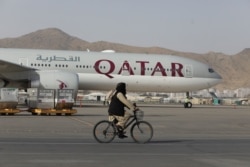With winter closing in across much of Afghanistan, American veterans organizations and other private groups are pressing the State Department for funding to continue evacuating thousands of vulnerable Afghans who didn't make it out of the country during the massive U.S. airlift in August.
The call for government funding for the increasingly expensive humanitarian operation came during recent meetings between the private organizers and State Department officials. While the State Department, which is leading the Afghan relocation effort, hasn't said whether it would fund charter flights organized by the groups, organizers say such assistance could help accelerate what has been a sluggish endeavor so far.
"There is more of an effort by State to try to take the driver's seat in this evacuation, which is great," said Sara Yim, co-founder of Transit Initiatives, one of several volunteer organizations supporting Afghans awaiting evacuation.
"If the U.S. government cannot expedite evacuations on their own, the fact that they're willing to partner with private organizations to do that is, in my mind, still a win, because private organizations are the ones providing a lifeline and are connected to Afghans on the ground," Yim said in an interview with VOA.
Since leading the evacuation of nearly 124,000 civilians from Afghanistan following the Taliban takeover in August, the Biden administration has faced mounting criticism over leaving behind thousands of Afghans and up to 1,000 Americans.
State Department spokesman Ned Price did not answer directly when asked at a press briefing last week whether the United States is providing financial assistance for private charter flights, instead mentioning "charter operations" the U.S. has worked on with Qatar and Pakistan.
In September, the U.S. paid for seats for hundreds of American citizens, green card holders and others on several Qatar Airways and Pakistan International Airlines flights to Doha and Islamabad for relocation in the United States.
Increasingly, however, the State Department views private charter flights as a valuable alternative until commercial flights resume.
"Our goal is to make [charter flights] even more routine, to lend a degree of automaticity to these operations," Price said.
Costly endeavor
Chartering evacuation flights is expensive. A private charter from the northern Afghan city of Mazar-e-Sharif to a military base in the Middle East — a common destination for Afghan evacuees — can cost upward of $750,000, according to organizers.
"It's not easy to raise a half million at the drop of a hat," said Minda Aguhob of the Female & Free Speech Airlift, a volunteer coalition evacuating people from Afghanistan. "That's what you need just to get the flight off the ground, and another quarter million to house people so you're not sending them to starve."
As a result, cash-strapped organizations have often pooled resources to jointly fund flights or put evacuees on flights paid for by other groups.
"If another organization has a group they're trying to get out, and they have been funded to get this group out but they have extra seats on this plane, they don't want to let those seats go unfilled," said Phil Caruso, chairman of the nonprofit No One Left Behind. "So, they'll reach out to other organizations to say, 'Hey, do you have anybody who's ready and willing to travel, who has the required documents, and so on? And can you get them here?' "
Getting a charter flight off the ground requires delicate international diplomacy, said Alex Plitsas, a spokesman for Human First Coalition.
"To get all those folks in, you have to get a flight that's willing to land in Afghanistan. And from there, you have to have a third country that's willing to receive them — and that depends on their paperwork status," Plitsas said.
Human First Coalition said it helped evacuate 6,000 people during the U.S.-led airlift. The group has since evacuated several hundred Afghans and is currently housing several thousand others waiting to leave Afghanistan.
"Our operational costs are into the millions of dollars every month, so we definitely are in need of donors and funding support, just to be candid with you," Plitsas said, noting that their operation is privately funded.
Chad Robichaux, co-founder of Save Our Allies, a veterans and military support coalition, said government funding for private charter flights could make a big difference.
"The right thing would be to help these people get out, for the government to step in and help fund getting these people out," Robichaux said in an interview with VOA.
With funding from conservative radio host Glenn Beck's Nazarene Fund, Save Our Allies has helped organize nearly 20 charter flights to evacuate more than 2,000 people in recent weeks, most of them military interpreters, vulnerable women and children, and Christians facing persecution.
The group has a priority list of about 3,000 vulnerable Afghans it wants to evacuate. But with media interest in Afghanistan diminishing, Robichaux said donor fatigue remains a concern.
"As soon as the news cycle stops talking about it, it's going to be a lot harder for us to raise the funds to do what needs to be done," he said.
It's not clear how many at-risk Afghans remain stranded. Some estimates put the number at upward of 100,000. Plitsas said his organization is determined to continue its mission until one of two things happens: "Either we run out of funding and are unable to operate, or we get everybody out who we need to get out on these flights."







